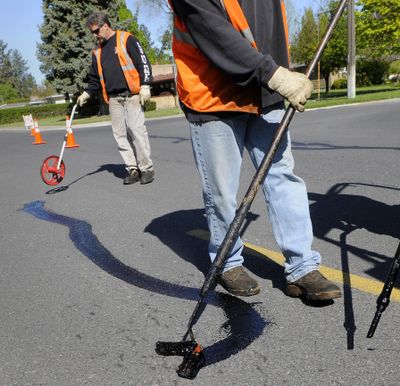Tab tax work stalls
Many projects on hold over contracting-hiring debate

More than half the money allotted for street paving and improvements this year from Spokane’s new vehicle tab tax may not be spent in 2012, as officials debate whether to hire city workers or contract with private companies to do the work.
Spokane Mayor David Condon decided earlier this year to contract much of the work to private companies, contradicting a recommendation from a citizens advisory board.
Condon said in an interview in March that he decided to pursue contracts with private companies because the work likely would be completed in a more timely fashion.
“That’s really what I’m looking at: How can we get the best service for the citizens?” he said.
But a report this week from the citizens board appointed to advise the city on using the Transportation Benefit District tax showed that projects accounting for 55 percent of the tab taxes that were expected to be spent this year won’t be completed until 2013.
Some City Council members worry that the delay will hurt the credibility of the program with taxpayers.
“I’m disappointed,” said Councilwoman Amber Waldref. “I had high hopes that we would be able to complete what the TBD board had passed and approved.”
City Administrator Theresa Sanders disputed the number in the report and said a great majority of the proposed work likely will be completed this year, though some of the tab tax projects may be completed by delaying street projects funded by other taxes. She said the Street Department is compiling a new plan to complete more of the tab tax program this year.
The tax, approved by the City Council last year, collects $20 for most vehicles registered within city limits and is expected to raise about $2.5 million a year.
Officials said projected delays of tab tax projects have occurred because the new administration wanted to make sure it was pursuing the best course and because bidding projects out is time-consuming. Administrators also worry about hiring workers as the city faces a $10 million deficit for 2013, fearing they’d face layoffs by the end of the year.
Interim Public Works and Utilities Director Gerry Gemmill said the city is now studying the possibility of hiring seasonal workers to complete crack-sealing projects on residential streets. He said tab tax-supported paving projects that aren’t completed this year won’t be forgotten.
“These projects don’t disappear if they don’t get done in 2012,” Gemmill said. “They’ll get done in 2013.”
Condon argues that the tab tax was sold to the public as helping to smooth city streets by paving and sealing cracks. That work isn’t possible in the winter, so hiring full-time workers would mean some of the tab tax money would end up supporting other street functions such as street cleaning and plowing.
“Is that how the TBD tax was sold to the citizens, to embed what we traditionally do into a new tax?” Condon said in March. “I don’t believe it was. I believe we were going to get new projects.”
But City Council President Ben Stuckart said he believes contracting the work to private companies will end up costing more than hiring city workers for a full year’s work.
“From what I’ve seen, the original proposal approved in December – hiring employees – got a lot more done than what we’re told is now happening,” he said.
John Covert, chairman of the citizens advisory committee, said based on Street Department statistics, he believes it would be cheaper to hire city workers. But contracting out will allow the committee to accurately compare the cost of using city workers and private contracting.
“We don’t care if you contract it out or do it in-house,” Covert said. “We just want it done the most cost-effective way.”